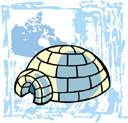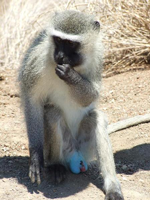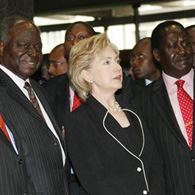 Clive Crook is such a calm, sensible, non-ideological voice, that if you ever get him really upset, you're in deep trouble. And he could hardly contain himself at his blog at the Atlantic on Climategate, in which some climate scientists engaged in censorship and cover-ups:
Clive Crook is such a calm, sensible, non-ideological voice, that if you ever get him really upset, you're in deep trouble. And he could hardly contain himself at his blog at the Atlantic on Climategate, in which some climate scientists engaged in censorship and cover-ups:
The closed-mindedness of these supposed men of science, their willingness to go to any lengths to defend a preconceived message, is surprising even to me. The stink of intellectual corruption is overpowering.
Clive is also hard on the head of the Intergovernmental Panel on Climate Change (IPCC) who saw no problems of bias, even when contributing scientists said about studies they didn’t like: they “will keep them out {of the IPCC report} somehow - even if we have to redefine what the peer-review literature is!"
One problem that Clive points out is that some climate scientists don’t know that much about statistics and show little interest in consulting statisticians even while they are basing their finding on statistical analysis. The Wegman report on the “Hockey Stick” controversy has this amazing summary:
It is important to note the isolation of the paleoclimate community; even though they rely heavily on statistical methods they do not seem to be interacting with the statistical community.
Once the real statisticians looked, one "Hockey Stick" result fell apart: the conclusion that
the decade of the 1990s was the hottest decade of the millennium and that 1998 was the hottest year of the millennium cannot be supported by {the} analysis.
Clive considers some of the reactions to his blog in a subsequent post, and is unyielding:
Once scientists set out to mislead the public, they can no longer expect to be trusted. End of story.
So is Clive a climate “denialist”? Or am I a “denialist” by featuring this story on the opening day of Copenhagen?
That such questions are even on the table is itself a symptom of the problem. A less balanced but still insightful piece by George Will in Sunday’s Washington Post complains bitterly about this. Part of the problem is the real “denialists,” who DO ignore science -- but scientific dishonesty is not exactly a confidence-building response.
The analogy that got me interested in Climategate is of course with social science in development, where the problem is vastly worse. Advocacy on global poverty distorts everything from the data to the econometrics, as this blog frequently complains, so that credibility of development social scientists is sinking to dangerously low levels. It’s so bad that there is never a “Povertygate” scandal, because “Povertygate” is the norm rather than the exception.
What’s most tragic about both climate and poverty advocates engaging in censorship and distortion is that, while it might help advocacy in the short run at the expense of science, it destroys both advocacy and science in the long run. It’s infeasible for every individual to independently do their own research to verify problems and proposed solutions, so they have to trust the professional, full-time researchers. As Clive understood, if those researchers destroy that trust, then even honest advocacy becomes increasingly impossible, which means solutions become increasingly impossible.
Since any meaningful agreement on emissions at Copenhagen is about as likely as igloos in the Sahara, maybe the delegates could pass a resolution in defense of responsible criticism?
 From Aid to Equality
From Aid to Equality

 Here’s another discussion relevant to the earlier post that
Here’s another discussion relevant to the earlier post that  Clive Crook is such a calm, sensible, non-ideological voice, that if you ever get him really upset, you're in deep trouble. And he could hardly contain himself at
Clive Crook is such a calm, sensible, non-ideological voice, that if you ever get him really upset, you're in deep trouble. And he could hardly contain himself at  In a recent experiment, a team of scientists trained a vervet monkey to open a container of apples, a task no other monkey in her group could do. She was well-compensated for this service by the other monkeys, who began to spend a lot of time grooming her (apparently, grooming is the monkey unit of exchange). Then, the scientists trained another monkey in the group to get the apples, and the “price” for the service (ie the amount of grooming the apple-providing monkeys received) went down.
In a recent experiment, a team of scientists trained a vervet monkey to open a container of apples, a task no other monkey in her group could do. She was well-compensated for this service by the other monkeys, who began to spend a lot of time grooming her (apparently, grooming is the monkey unit of exchange). Then, the scientists trained another monkey in the group to get the apples, and the “price” for the service (ie the amount of grooming the apple-providing monkeys received) went down.  There is an
There is an 
 Secretary of State Hillary Clinton had good news for Africa in the Nairobi forum yesterday on the US African Growth and Opportunity Act (AGOA). AGOA offers breaks from quotas and duties on African exports to the US. First enacted under Bush, AGOA is at least a partial success story, with exemplars like textile exports in Lesotho and Madagascar. Secretary Clinton yesterday
Secretary of State Hillary Clinton had good news for Africa in the Nairobi forum yesterday on the US African Growth and Opportunity Act (AGOA). AGOA offers breaks from quotas and duties on African exports to the US. First enacted under Bush, AGOA is at least a partial success story, with exemplars like textile exports in Lesotho and Madagascar. Secretary Clinton yesterday 